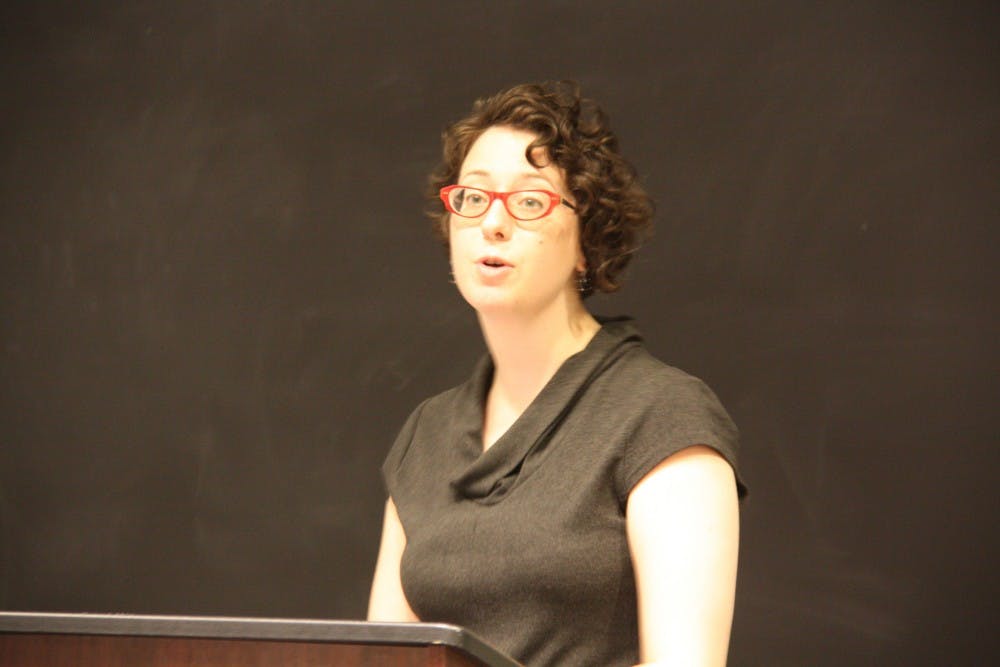
This past Tuesday, Abigail Kluchin gave a "Psychoanalytic Perspectives" lecture as a part of a series titled, “From Miracles to Mindfulness: New Perspectives on Religious Experience.”
Credit: Pat GoodridgeYou could say that near-death experiences, hearing the voice of God and out-of-body journeys are not part of an average Penn student’s daily life.
They are, however, what lie at the core of religious movements and commitment. In an attempt to illuminate and re-examine such experiences, Tuesday's lecture on “Psychoanalytic Perspectives” was the second in a series of public lectures hosted until April by the Herbert D. Katz Center for Advanced Judaic Studies, the Department of Religious Studies and the Center for Neuroscience & Society. Lectures will take place every Tuesday evening.
Guest lecturers — neuroscientists, historians, philosophers, scholars of religion and others — will explore various aspects of religious experience in a lecture series titled, “From Miracles to Mindfulness: New Perspectives on Religious Experience.”
The lecture series’ companion course, “From Miracles to Mindfulness,” offers Penn students a closer look at how scientists, scholars and psychologists are utilizing systematized research methods to better understand religious experiences from a psychological angle. The course is taught by Steven Weitzman, a religious studies professor and Phillip Webster, a religious studies graduate student.
“If you think about the world religions, at the core of many of them there is some kind of unusual experience. It might be [the] experiences of having seen Jesus resurrected or seeing God in a burning bush or having some kind of cosmic insight into the nature of the universe,” Weitzman said. “And I realized even though I have been a scholar of religion for a long time, I don’t know why people have those kinds of experiences. So I wanted to see what scholarship today has to say.”
For College and Wharton senior Jane Chen, she took the course because her personal background coincided with her interest in thinking more critically about metaphysical experiences.
“I’m Christian, and it’s very interesting to think about [it] in an intellectual perspective instead of in the church. So for me it’s personal,” Chen said. “One interesting perspective that I have is: a lot of times in Christianity you want to evangelize and tell people about the religion and then there are people who are very rational and don’t really want to accept or think about it.
“So I almost thought for those friends it would be interesting to bring them to the lectures so they can hear it from an academic, intellectual perspective,” she said. “I’m not saying it’s to convert people but so that they can think about it, just even day-to-day things like morality.”
College freshman Elana Burack said the course was a unique opportunity for her as a potential religious studies major to hear from specialists in different fields.
“It’s definitely a very diverse class, and the lecture part is not so much about explaining and defining terms but it’s very much an analysis,” Burack said.
She added, “The lectures are speaking to an educated audience and expecting them to not have a background in religion. I also think if you’re interested in gender, but not religion, you should still go to the gender and religion lecture because it brings a different perspective and allows people to think about the experiences of others, even if you don’t want to think about your own.”
The Daily Pennsylvanian is an independent, student-run newspaper. Please consider making a donation to support the coverage that shapes the University. Your generosity ensures a future of strong journalism at Penn.
DonatePlease note All comments are eligible for publication in The Daily Pennsylvanian.







